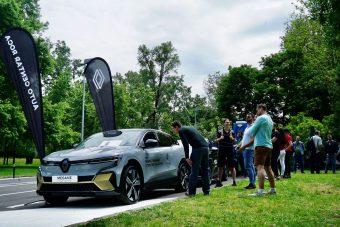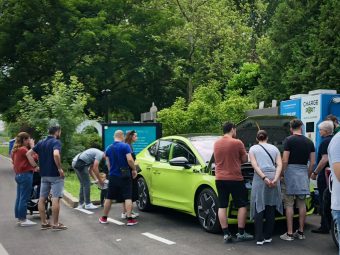
Traffic jams, polluted air, noise and the need for energy efficiency encourage the rapid development of electromobility. To reach its full potential, we have to solve a series of challenges that electrification causes. The national non-profit association from Croatia—Strujni Krug—has been dealing with everything associated with electromobility. We talked about the Association’s activities and engagement and the development of electromobility with Tin Koren, the Secretary-General, who also spoke about some interesting projects.
The Association became operational in 2019, and at that time, it gathered very few electric car owners willing to share their experience and knowledge with others. After a little more than a year, over 1,000 members joined the Association, willing to participate in the development of electromobility in Croatia. After only one year, Strujni Krug became a national e-mobility association with numerous initiatives. The Association has 1,500 active members who maintain contact with more than 10,000 e-car drivers and communicate daily with those who want to become members, so they are the largest association of this type in Croatia.
The Association’s Activities
The Association’s main goals are to inform and educate. By encouraging potential buyers to decide more easily on purchasing e-cars, they intend to boost sales of these vehicles in Croatia. By doing so, more people become familiar with the energy efficiency and zero emission of harmful gases provided by electric vehicles. Mr Koren says that in addition to activities in civil society, what needs to be done is to change the legal framework to unlock a new chapter that will facilitate building solid foundations for developing this sector.
“That is why Strujni Krug is working to change the legal provisions to facilitate the development of e-mobility projects and work more actively on improving and expanding the network of charging stations for electric vehicles,” Mr Koren explains.
IN FOCUS:
- CHARGE&GO CONTINUES TO BUILD A NETWORK OF CHARGER
- NOVI SAD STEPS INTO THE WORLD OF ELECTROMOBILITY
- ENERGY REHABILITATION CONTRIBUTES TO ENERGY SAVING AND ENVIRONMENTAL PROTECTION
The Association’s pilot project— placing chargers for electric vehicles in street light posts—is also worth mentioning. The project is inspired by developed European countries and is the simplest and most convenient way to improve the charger infrastructure.

“With the implementation of this project, over the next two years, more than 1,000 publicly accessible chargers will be placed in street light posts throughout the cities, which will significantly facilitate the daily use of electric cars for drivers who do not have their own parking spaces, i.e. charging spaces. On the other hand, this pilot project precedes another large-scale project during which we would like to install more than 100,000 such chargers in Croatia by 2028,” Mr Koren adds.
In the last three years, the Association has accomplished a lot. First and foremost, they recorded a significant increase in customer interest, as evidenced by the number of registered electric vehicles, which went up by almost sevenfold. In 2019, 730 registered electric vehicles were registered, while there are more than 5,700 this year. In addition to educating and participating in shaping regulations, proposals, and regulations, with the support of its partners, Strujni Krug also has benefits for its members― discounts for the purchase of electric vehicles, home chargers, comprehensive insurance and others.
Subsidies for e-mobility
Higher sales of electric cars were mostly initiated and facilitated by the co-financing of the Fund for Environmental Protection and Energy Efficiency (FZOEU), whose vision is to support Croatia’s sustainable development, reduction of greenhouse gases, development of circular economy, richer biodiversity, better waste management and the implementation of similar activities to benefit environmental protection. In cooperation with FZOEU, the Association is actively working on a very effective model for distributing funds intended for co-financing. The biggest obstacle to this initiative was the limited co-financing funds, so this year, they are also helping FZOEU find the optimal model for allocating funds. Negotiations with the Tax Administration regarding the abolition of VAT on the purchase of electric vehicles are ongoing, which would further facilitate this process, as the state would no longer have to allocate so much money to co-finance the purchase of these vehicles.
Prepared by: Milica Vučković
Read the story in the new issue of the Energy portal Magazine ELECTROMOBILITY.



